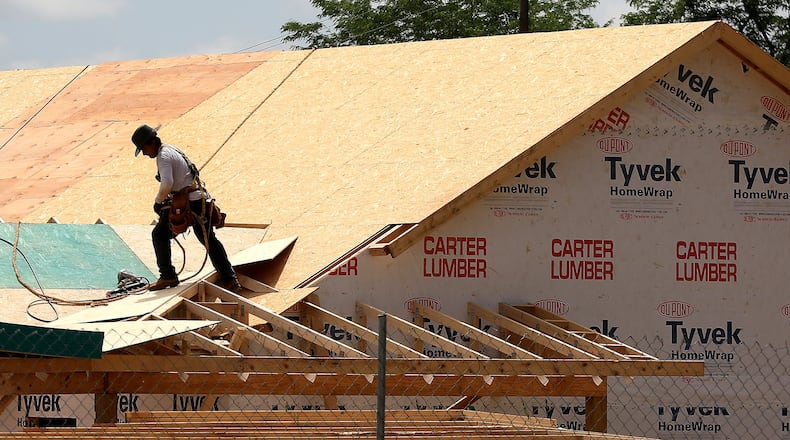Imagine this: Under a proposed law, your neighbor can finally finish their home redesign, complete with bright orange paint and a two-car garage coming right up to the street. It’s an obvious eyesore, but one local governments are powerless to stop.
That’s the future many local officials fear if a state bill is passed that would prevent cities and counties from controlling the look and design of homes.
Cities and counties around metro Atlanta are now uniting to fight House Bill 302. It would take away their ability to control things like the color and building material, number of rooms and other general design elements on single- and double-family houses.
In a clash between local governments and the state, many city councils and county commissions, including those in Brookhaven, Roswell, Dunwoody and South Fulton, are drawing up resolutions this week to formally oppose the bill.
At a meeting last week that included many Fulton County mayors, the bill was met with general condemnation around the table. Cobb County’s Board of Commissioners will vote on a resolution against the bill at their Tuesday night meeting. And the Association County Commissioners of Georgia and Georgia Municipal Association have both come out against it.
The bill could indirectly cause property values to “plummet” and lead developers and businesses to avoid areas that currently have sensible restrictions, Brookhaven City Manager Christian Sigman told The Atlanta Journal-Constitution Monday.
“It becomes the Wild West,” he warned. “It’s a local issue. It’s not a state issue … I have never seen such an overreach by another level of government.”
Ronda Smith, president of the Sandy Springs Council of Neighborhoods, said there is a lot of development happening in her neighborhood now, and she’s thankful for the city’s design rules as new homes are built.
“While you don’t necessarily want things to be cookie-cutter, you do want things to have a general look and feel and character,” she said.
OTHER LOCAL NEWS:
Municipal rules can ensure even the most basic architectural standards, like the fact that a home should have windows and a front door, Smith said.
“You wouldn’t necessarily want to have a wholly blank wall that would be a street-facing wall on the side of a home,” she said, “which would just be an unattractive blank slate.”
Groups like the Home Builders Association of Georgia are in favor of the bill, since they view local rules as unnecessary aesthetic restrictions that drive up costs and limit designers’ abilities.
“We see those design requirements (as) unnecessary costs that prevent a builder or developer from providing a lower-market, entry-level house if they’re having to comply with these design restrictions,” said Austin Hackney, the government affairs director of the home builders association.
Hackney pointed out the state already has a building code that sets minimum building standards.
“We’re talking about protecting the private property rights of your house or your neighbor’s house,” Hackney said. “Where does it ends with these encroachments into private property rights?”
The bill says it would not impact private contracts or agreements like a homeowner association. The bill would also not affect historic districts, which often have design constraints of their own.
Local restrictions were the reason cities incorporated in recent years, said Adrienne Duncan, a Dunwoody resident and president of the Dunwoody Homeowners Association.
“What’s good for one community may not be good for another,” she said. “That’s for us to decide, not for somebody who lives on the other side of the state.”
The bill narrowly made it through the House Agriculture Committee last Wednesday. It now sits in the Rules Committee, where its future is uncertain.
Its author, Rep. Vance Smith, R-Pine Mountain, said at the committee meeting that local design rules are a slippery slope that limit consumer choice.
“Should the state tell me what color I’m limited to when I build a home for my wife and my children? Is that a role of the state, when it has nothing to do structurally with the integrity and safety of the home? If we can tell people what color you’re limited to, how far can we go?” Smith said.
Smith did not respond to requests for comment Monday.
State Rep. Matthew Wilson, D-Brookhaven, said in an interview that he can sympathize with the home builders, but “this is an incredible overreach on their part.” Wilson, who sits on the agriculture committee, said the bill equates to “home builders losing their fight at the local level and then trying to come to the state and try to get a law passed that completely preempts local officials.”
Wilson said he does not expect the bill to make it out of the Rules Committee.
Many have likened the bill to a state law that keeps local governments from prohibiting wood as a construction material for taller structures like apartment buildings. That law, which passed last year, preempted some cities that tried to require those structures be made of a different material.
Opponents like Sandy Springs Mayor Rusty Paul said design rules affect the feel of a neighborhood and ensure a quality standard, especially when it comes to a home’s building material. Residents, he said, “can expect that the basic character of that neighborhood would remain relatively stable,” and not be subject to only the state’s housing requirements. “What community wants to hang their hat on minimum standards?”
Staff reporter Jim Galloway contributed to this report.
In other news:
About the Author
The Latest
Featured




